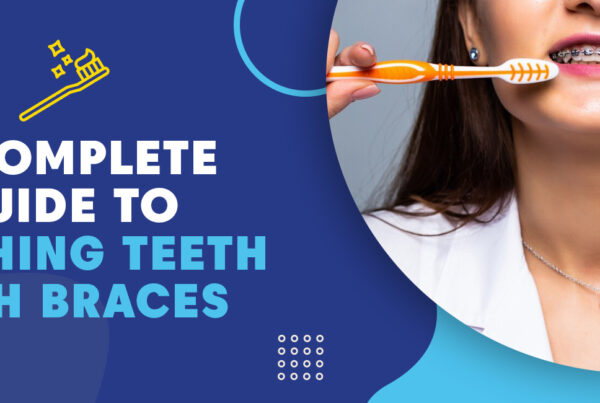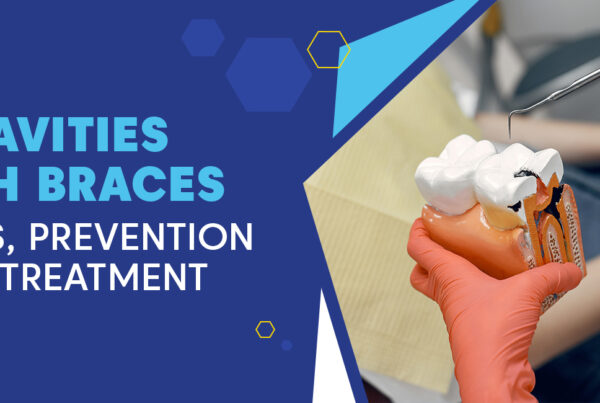- First Day With Braces: What To Expect?
- Managing Discomfort And Pain In The First Week Of Braces
- Eating With Braces: Foods To Avoid
- Oral Hygiene Routine Changes: Brushing And Flossing With Braces
- Speech Changes And How To Deal With A Lisp From Braces
- Survive The First Week Of Braces Pain-Free With Orthodontic Experts
Are you ready to begin your orthodontic journey? If you have just gotten braces, congratulations! The beginning of your treatment can be both exciting and challenging. Knowing what to expect in the first few days after getting braces can help you ease into your routine quickly and comfortably.
If it’s your first time getting braces, adjusting to the changes in your mouth may take some getting used to. From soreness, to what to eat, to tips on how to care for your braces, this blog has everything you need to know about your braces experience during the first week.
With some preparation and knowledge, the first week with braces can go smoothly. Let’s get started with some insight into what the first week is like so you can be ready for whatever comes up!
First Day With Braces: What to Expect?
If you’ve decided to get braces, the first day of your journey can be a little overwhelming. After sitting in the orthodontist’s chair and having brackets and wires placed on your teeth, you should expect some minor discomfort as you adjust to the new sensation.
Here are a few things that you can expect during the first day of having braces:
- Soreness: You may feel a moderate level of soreness on the day of installation and possibly for a few days afterward. It should subside after that, but an orthodontist may prescribe a mild pain reliever if needed.

- Discomfort: It’s important to remember that your braces will likely cause some discomfort during the first few days. Your mouth is adjusting to the new braces, and this can be uncomfortable. To help alleviate any discomfort, try using orthodontic wax to cover any areas that are causing pain.
- Difficulty Eating: Eating with braces can also be a challenge at first. The brackets on your teeth can make it difficult to chew certain foods, especially hard or sticky ones. To avoid discomfort, it’s best to stick to soft, easy-to-chew foods in the first few days. Be sure to take smaller bites and chew slowly to avoid any unnecessary discomfort.
- Speech Adjustment: With your teeth now covered in metal, your speech may come out differently than usual—it’s common to lisp or slush when talking at first. This can be due to the extra bulk in your mouth and the new positions of your teeth. You may find it difficult to pronounce certain sounds or words. Don’t be alarmed, it only takes about 3 weeks for your mouth to adjust and for you to speak clearly again.
You’ll also receive instructions on how to take care of your braces at home—including brushing strategies with special tools—so make sure to follow them carefully as they will help prevent any issues with plaque buildup.
Managing Discomfort and Pain in the First Week of Braces
Many people find that they experience some pain and discomfort during the first few days after their braces are fitted. Fortunately, Orthodontic Experts, a leading orthodontist with multiple clinics including locations in Arlington Heights, Harwood Heights, and Bucktown, has put together this guide to help you manage pain and discomfort during the first week of your braces.
- Apply Anesthetic Gel: One of the best things you can do to manage braces pain in the first is by applying topical anesthetic gel. Anesthetic gel is a topical gel that can help to numb the area where your braces are fitted. Apply a small amount of gel to the affected area before going to bed to help you sleep more comfortably.
- Take Over-the-Counter Pain Relievers If anesthetic gel isn’t providing enough relief, you may also consider taking over-the-counter pain relievers. Acetaminophen and ibuprofen are two of the most commonly used pain relievers for braces pain in the first week. Always follow the prescribed dosage, and do not exceed the recommended dose.
- Ice Pack: Another effective way to manage pain and discomfort in the first week of braces is to use an ice pack. Apply an ice pack to the affected area for about 15 minutes at a time. This can help to reduce swelling and inflammation.
- Warm Salt Water Rinses: Warm salt water rinses can help to soothe sore gums that may be caused by braces. Mix a teaspoon of salt with warm water and rinse your mouth for about 30 seconds. Do this several times a day to help reduce pain and discomfort.
- Orthodontic Wax: Finally, you may consider using orthodontic wax to manage pain and discomfort in the first week of your braces. This is especially important if any of your braces are irritating your lips, cheeks, or gums—just a small dab will provide cushioning and protection to those areas so you can live with more comfort.
Eating With Braces: Foods to Avoid
The first day with braces can also be especially difficult. Your mouth may be sore, and simply eating anything can be painful. It’s important to first drink plenty of water to keep your mouth hydrated. It’s recommended to consume soft foods to avoid any additional discomfort.

It might seem like a lot more work in the very beginning, but you’ll get used to eating with braces in no time. Just remember that the food you eat during the first week of your treatment can affect your braces—and not in a good way.
To avoid damaging and breaking your braces, it’s best to avoid the following foods:
- Sticky and Chewy Foods: Sticky and chewy foods can get stuck in your braces and cause complications. This includes sticky candy such as caramels, taffy, gummy bears, and chewy granola bars.
- Hard Foods: Although your braces are attached to your teeth with strong adhesive, they are still susceptible to damage from hard foods. This includes hard candies, nuts, and some vegetables like raw carrots and apples.
- Crunchy Foods: Crunchy foods such as popcorn and chips can also cause damage to your braces. Biting down on these foods can cause brackets to become loose, leading to further discomfort during your first week with braces.
If you do find yourself needing a snack throughout the day, most soft fruits (such as bananas) and vegetables (like steamed carrots) are safe bets—but be sure to cut them into small pieces first! During this first week with braces, it’s best to stick with mashed potatoes, macaroni & cheese, yogurt melts, soup or pudding whenever possible!
Oral Hygiene Routine Changes: Brushing and Flossing With Braces
When it comes to keeping your teeth clean while wearing braces, your oral hygiene routine needs to change a bit. It might take a few days to adjust, but the health of your smile depends on it!
Not only do you need to start brushing and flossing after every meal, but you also need to take extra steps:
- Use a toothbrush designed for braces: It has bristles that are rounded at the end and can reach those hard-to-get spots.
- Angle the toothbrush 45 degrees between the braces and the gums: This allows for the best cleaning along each tooth surface.
- Floss in an up-and-down motion: This gently slides it between the teeth and under the braces.
- Use special dental flossers, floss threaders or interproximal brushes: These products can help get around braces so every area of your teeth is cleaned out completely.
- Use fluoride mouthrinse as directed by your orthodontist/dentist: Regular use of an effective fluoride rinse helps strengthen tooth enamel against cavities and decay during treatment with braces.
- Regular professional cleanings: Plaque buildup can now cause more harm due to food particles getting stuck in the brackets and wires of braces, so scaling after every 6 months is important!
Speech Changes and How to Deal With a Lisp From Braces
It’s only natural if you have some speech changes with braces. The brackets and wires can make it difficult for your tongue to move around as it usually does, and you may experience a slight lisp, which is normal and will improve over time. Here are a few things you can do to help with the lisp:
- Make regular trips to the orthodontist: They may be able to make minor adjustments or prescribe a wax or rubber band on the brackets to help.
- Practice speaking out loud: This is a great way to develop muscle memory and get used to speaking with your braces.
- Speak slowly and exaggerate the words: Doing this helps determine where you’re putting pressure on your teeth and mouth that could be causing articulation issues.
- Ask your friends for help: They already understand how you talk and can easily identify any differences in speech.
It takes time, but eventually, you’ll be able to speak without any difficulty again!
Survive the First Week of Braces Pain-Free With Orthodontic Experts
Surviving the first week of braces can be an overwhelming experience, but it doesn’t have to be painful. With Orthodontic Experts, it’s possible to get through the initial adjustment period without discomfort. We are committed to providing exceptional care and support throughout your entire orthodontic journey. Our team of orthodontic specialists use advanced techniques to minimize pain and ensure a smooth transition into life with braces.
We advise our patients to follow the instructions, maintain good oral hygiene, and take over-the-counter pain relievers as directed to make the first week with braces pain-free. Finally, keeping a positive mindset and focusing on the end result of a beautiful, healthy smile is key to getting through the first week of braces. Talk to our friendly orthodontists if you have any questions or concerns and they’ll help guide you through the process. So, if you’re considering braces, choose Orthodontic Experts to experience a safe and comfortable orthodontic journey.










